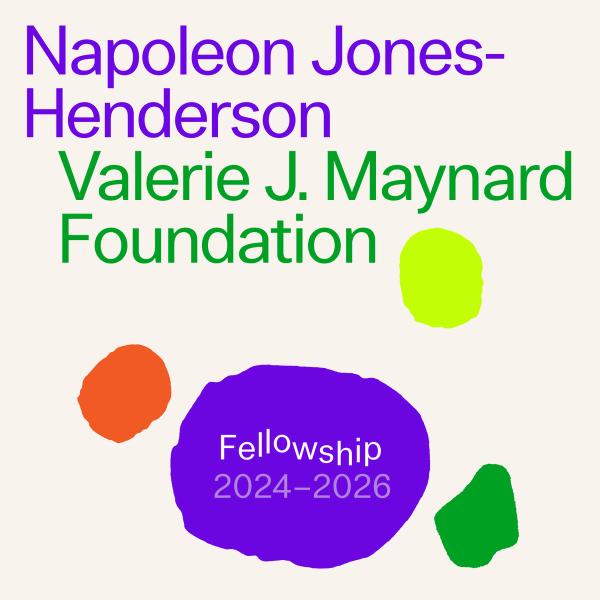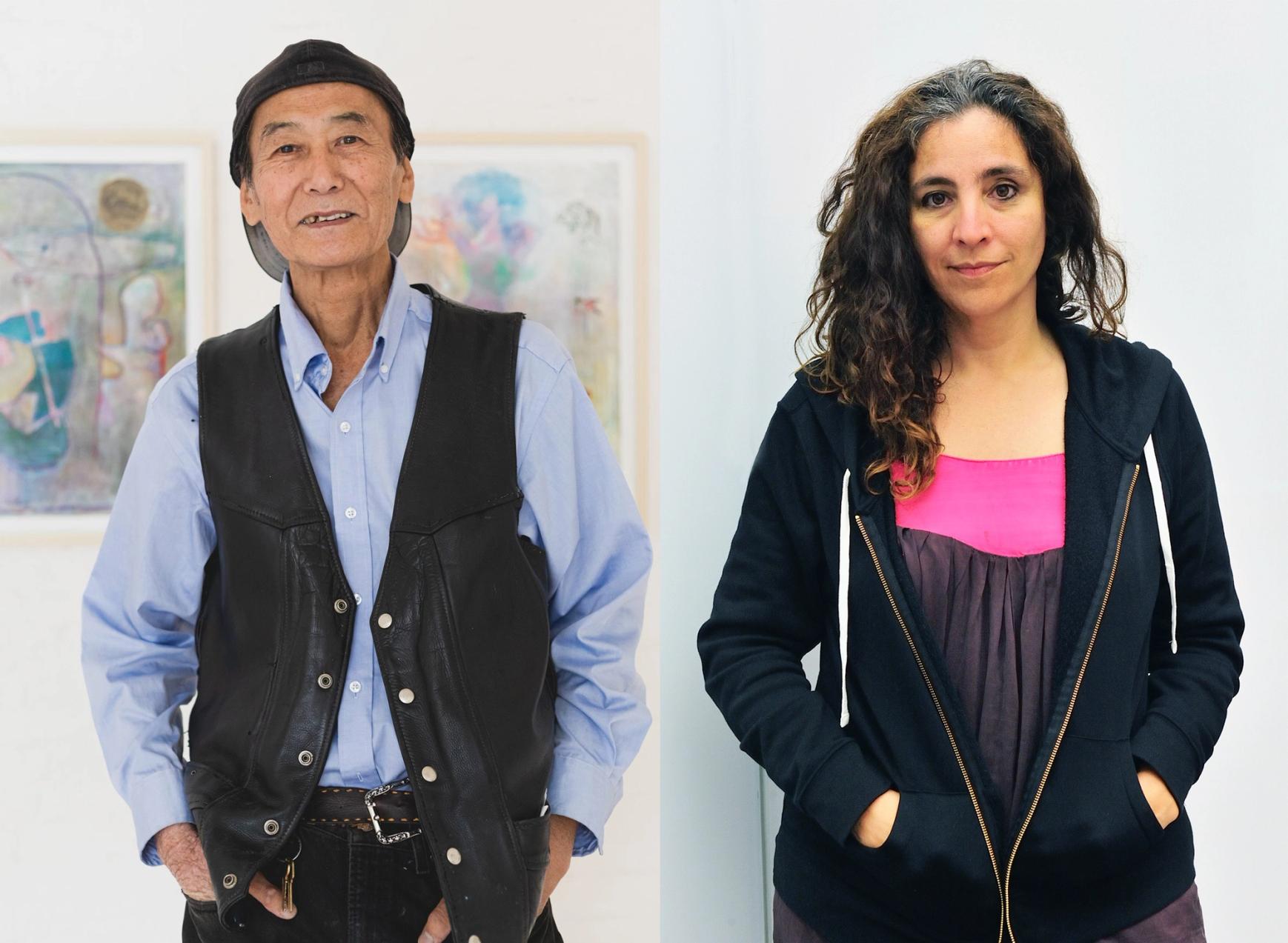2024-2026 Fellowship Awardees: Napoleon Jones-Henderson and the Valerie J. Maynard Foundation

We're pleased to announce our newest Fellowship awardees: multidisciplinary artist Napoleon Jones-Henderson and the Valerie J. Maynard Foundation. The CARA Fellowship, now in its second year, is awarded to mid-career artists and artists' estates and legacies with a demonstrated, profound commitment to their craft and cultural impact. The Fellowship program will provide Jones-Henderson and the Valerie J. Maynard Foundation with unrestricted $75,000 grants in addition to individually tailored support over a two-year term.
Napoleon Jones-Henderson and the legacy of Valerie J. Maynard, stewarded by the Valerie J. Maynard Foundation, were selected for their significant contributions to the transformation of arts ecosystems. Both Jones-Henderson and Maynard showcase lifelong dedication to centering and celebrating Black identities and experiences. Maynard herself was a pivotal figure in the Black Arts Movement and Jones-Henderson remains one of the last of the original ten members still active in AfriCOBRA (African Commune of Bad Relevant Artists), among other community movements. Working across mediums such as textiles, sculpture, print-making, and community gathering, both artists' transformative art practices honor Afro-diasporic histories, both familial and cultural, while paving the way for the future generation of artists through education.
About the Fellows

Napoleon Jones-Henderson (b. 1943, Chicago, Illinois; lives and works in Roxbury, Massachusetts) is a renowned artist with a long-term commitment to cultural representation and community engagement. A key figure in AfriCOBRA (African Commune of Bad Relevant Artists), founded in 1968, as well as other intergenerational networks of Black artists, he creates images inspired by the lived experiences and cultures of communities in the African diaspora. Often using the medium of public art, Jones-Henderson’s work is rooted in a desire for community connection through what he calls “visual music,” a rhapsody of colors, materials, and symbols. Beyond his artistic creations, he has been an influential educator and mentor, holding various academic positions and engaging in community building through art. Jones-Henderson’s work has been shown at the Studio Museum in Harlem, the 58th Venice Biennale, and a 50-year retrospective at ICA Boston, among others. The support of CARA’s Fellowship will allow for the continuation of Jones-Henderson’s practice through the multimedia expansion of his ongoing series Requiem for Our Ancestors and the creation of portraits of his family, which he calls a visual memoir.

Valerie J. Maynard (b. 1937, Harlem, New York; d. 2022, Baltimore, Maryland) was a prolific sculptor, printmaker, designer, and educator. She is internationally recognized for an artistic practice centered on Black resistance to social injustice, the beauty of Black life in spite of those injustices, and the impact of ancestral memory on the descendants of enslaved Africans. Since Maynard’s passing in 2022, her legacy has been stewarded by the Valerie J. Maynard Foundation, a non-profit trust intentionally established by the artist and composed of her collaborators, friends, and fellow artists. The mission of the Valerie J. Maynard Foundation is to sustain, expand, and preserve the legacy of Valerie J. Maynard, her art, and her impact on a global scale, while also nurturing the next generation of Black women artists. The Fellowship will serve to support the sustainability of the Foundation’s critical work.
More about the CARA Fellowship
The CARA Fellowship aims to nurture artists across disciplines, uplifting knowledges and voices from different geographic contexts and making alternate historical perspectives visible. The Fellowship provides recipients with unrestricted $75,000 grants in addition to individually tailored support over a two-year term. This approach aims to imagine holistic care for artists and their practices and prioritizes process and exploration, rather than a specific set of outcomes. Awarded artists decide how best to use the funds to nurture their life and work in conversation with the CARA team to create sustainable frameworks for their practices.
Over the two-year term, Fellows work closely with the CARA team to create supportive frameworks surrounding their practices. CARA takes a holistic, relational approach to its work with all Fellows, seeking to center artists' needs and desires through open dialogue and resource sharing. Additional support provided by CARA varies for each Fellow, but can include access to archival assistance, debt counseling, legal advisory, support navigating social services, and facilitating relationships with relevant scholars, curators and institutions. This artist-responsive way of working prioritizes each Fellows’ process rather than a specific set of outcomes.
The 2024-2026 Fellowship awardees were selected following a rigorous process of nomination and deliberation. Over 50 nominations were received from a diverse cohort of 20 arts and cultural workers, artists, and writers including: Zakiya Collier, Lia Gangitano, Steffani Jemison, Emily Johnson, Gerardo Mosquera, Tavia Nyong'o, Meg Onli, Rianna Jade Parker, Pablo José Ramírez, David Teh, and McKenzie Wark, among others. This process reaffirms CARA’s commitment to supporting a wide range of artistic practices, responding to feedback from community members across geographic contexts and disciplines.
The Fellowship–in dialogue with CARA’s other initiatives–is informed by CARA’s guiding question, which draws from the thinking of Yanomami philosopher Davi Kopenawa. How can we dream not only about ourselves? Inspired by this question, CARA’s exhibitions, publications, and public programs form an ecology of research in material, intangible, and embodied practices.
The CARA Fellowship was developed with support from United States Artists and is generously funded by the Karsh Family Foundation. The program is lead by CARA's Senior Curator Rahul Gudipudi.
